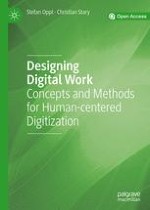Open Access 2019 | Open Access | Buch

Designing Digital Work
Concepts and Methods for Human-centered Digitization
verfasst von: Stefan Oppl, Christian Stary
Verlag: Springer International Publishing
Open Access 2019 | Open Access | Buch

verfasst von: Stefan Oppl, Christian Stary
Verlag: Springer International Publishing
Combining theory, methodology and tools, this open access book illustrates how to guide innovation in today’s digitized business environment. Highlighting the importance of human knowledge and experience in implementing business processes, the authors take a conceptual perspective to explore the challenges and issues currently facing organizations. Subsequent chapters put these concepts into practice, discussing instruments that can be used to support the articulation and alignment of knowledge within work processes. A timely and comprehensive set of tools and case studies, this book is essential reading for those researching innovation and digitization, organization and business strategy.